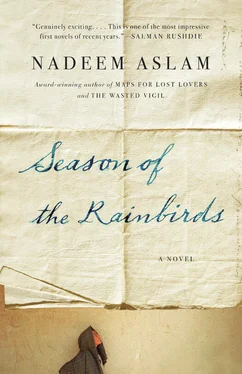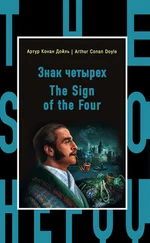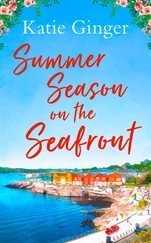‘For God’s love!’ Maulana Hafeez extracted his hand from Mujeeb Ali’s grip.
The traveller was being led out of the hall by the second man — one hand wrapped around his neck, the other gripping a forearm — and there was a violent jerk every time he resisted.
‘Mujeeb,’ Maulana Hafeez said, ‘stop them.’
The man leading the traveller came to a halt, and glanced at Mujeeb Ali. A nod and he resumed walking, pushing the other towards the door.
‘He’s a guest in God’s home. We have no right to treat him this way,’ Maulana Hafeez protested.
‘Forgive me, Maulana-ji,’ Mujeeb Ali began at last, ‘but do you know who that man is? Do you know what kind of questions he’s been going around asking?’
‘I thought he’d come to see that goat,’ Maulana Hafeez said uncertainly. ‘And even though I disapprove of such things I couldn’t turn away a traveller. I was intending to talk to him about it soon.’
Once in the street the traveller was released. His shirt was torn at the neck and there were scratches on his throat.
Mujeeb Ali shook his head with a little smile at the cleric’s reply, and explained the reason for the traveller’s presence in the town. ‘This is a decent town, Maulana-ji,’ he concluded, ‘for decent people. We don’t want people like him roaming around amongst our daughters and sisters.’
Maulana Hafeez spent a few moments calming his breath. ‘Anger is sin, Mujeeb,’ he said and added, ‘Get those guns out of the mosque.’
Mujeeb Ali waved the men out of the mosque and began to put on his shoes. Maulana Hafeez followed. When Mujeeb Ali stood up the cleric said: ‘I went to see the postmaster earlier. He said that—’
‘I know.’ Mujeeb Ali raised his hand. ‘Maulana Dawood went to see him this morning, Maulana-ji. I was on my way to the post office just now when I remembered about the wandering hero.’ He smiled.
Maulana Hafeez glanced sharply at the four men standing outside the mosque. He grabbed Mujeeb Ali’s arm. ‘Mujeeb!’
‘Don’t worry, Maulana-ji.’ Mujeeb Ali patted the cleric on the shoulder. ‘Everything will be fine.’ He pointed at the clock on the veranda and said, ‘Shouldn’t you be making the call for Magrib, Maulana-ji?’

Once a day I have to walk to Bano’s house for fire. Swinging the terracotta bowl of the hookah, I cross the street and enter the field. The air is hot and dry but the grass around my feet is damp. A band of gypsies sifts the rubbish dump, searching for bones to sell to the fertiliser factory. A grimy finger burrows deep into the filth and fishes out a three-angled bone resembling a shoemaker’s last. A ghostly bérry tree, studded with yellow berries, reaches out from the courtyard of Bano’s house and keeps almost half the street in shadow. Waxy ants drop on to the passers-by. Occasionally, a stone, thrown by a boy to dislodge the berries, lands in the courtyard. Bano sighs and says, ‘If you have a fruit tree in your courtyard you should expect stones.’ I cross the shadow-speckled hush of noon and knock on the door .
In the partial darkness of the veranda Bano sits sieving wholemeal flour through a muslin hammock. She is so engrossed in the chore that flies drinking fluid from the corners of her eyes go unnoticed. Below the hammock is a large brass dish which catches the shower of plain flour, to be used for making pastry. She raises an eyebrow for emphasis and asks me whose daughter I am. The corners of her mouth are white with froth. She claps her hands — imitating the fluttering of a butterfly’s wings — and sends a puff of flour into the air. She takes the hookah bowl and goes over to the clay stove where the cow-dung fuel burns. Some hookah smokers, like Father, seem to prefer the cow-dung fire to ordinary coals .
Bano cuts off the whiskers of her marmalade cat; she says the plague germs are carried on a cat’s whiskers. The cat and the goslings live in harmony. The goslings’ tiny melodious whistles turn to trumpet-like honks with age. They peck at the balls of wool as Bano loops the strands around her left hand and elbow. The cat sniffs the core of an apple. It shivers .
The top two squares of each window have jade underwater mirrors instead of glass. Some of the panes are cracked and throw feathery rainbows across the veranda at certain times of the afternoon. Izmayal, Bano’s husband, with a skin as deeply pored as orange peel, is in the small room off the veranda. He lies on his side with one bent knee raised in the air — a three-angled shoemaker’s last. He cocks a finger at me. He exists outside the domain of mundane happenings. His time is not commensurate with the rest of the world. Ripe with wisdom, cunning and self-knowledge; manly, abstemious and brave, he is alternately execrated and idolised by me. He fought in the Bangladeshi war, and now has no feet. We lost that war and when he came back everyone spat at him. An old woman struck him on the face. He knows the names for the winds at every point of the compass. He taught me the rhyme that helps me to remember the correct spelling of Mississippi. He says that four fledgling hummingbirds can fit into the bowl of a teaspoon, and that an adult hummingbird, once stripped of beak and feathers, is no larger than a bumble-bee. With effortless regality he feeds shiny pieces of knowledge to me. What is manifest to him is news to me. And yet I am afraid of approaching him; I listen to his stories from the door. I scratch behind my right ear with the first finger of my left hand .
Once I found Bano struggling with the cork of a large bottle. She started, stammered and, recovering, said it was a king-size Coca-Cola bottle, found nowhere else but Lahore. Had I never seen one before? Hadn’t I ever been to Lahore? No? I should get my mother to take me .
Once every three months Izmayal drags a rope cot out into the courtyard and pores over the columns of premium-bond-winning numbers. The crispy brittle bonds look like toy money. Izmayal arranges them like a hand of cards before him. Bano circles the cot, praying. Izmayal crouches on all fours — a bee on a flower — and tries to match the numbers. The cot creaks its protest. A shout escapes Izmayal when the first few numbers of a winning sequence raise his hopes and guide him along, only to mock him with the last digit of the sequence. An infinite variety of options reveal themselves to him during these first few seconds. His frustration is evident from the throbbing of his temples and the tightness of his jawline. He gathers the bonds and puts them away to ferment for another three months. How could one’s happiness be reduced to the status of a number in a sequence, he seems to be asking himself. Crestfallen, he pulls himself across the courtyard and the veranda and goes back to his room .
One of Bano’s cows has a pink udder. It is here that a bat once planted its fangs. The bats wander all over the body, their heat-sensors searching for the tissue richest in blood. Bano calls me over and directs the pink appendage at me. I open my mouth and a thin thread of milk enters my mouth, clear of my lips. She lets me feel the calf’s head for the stumps of the emerging horns .
I stand in the door and Izmayal explains to me what a shooting star is. Halfway through the explanation I lift an exultant finger in the air: I know what he’s talking about. The cleric’s wife says that they are arrows of fire hurled by Allah against the evil djinn when they try to attain to the lower heavens to overhear the conversation of angels. Izmayal laughs, slightly short of breath and with echoes that seem to unfurl for ever. His lips ride up his yellow teeth. ‘There’s no Allah, girl.’
Читать дальше













